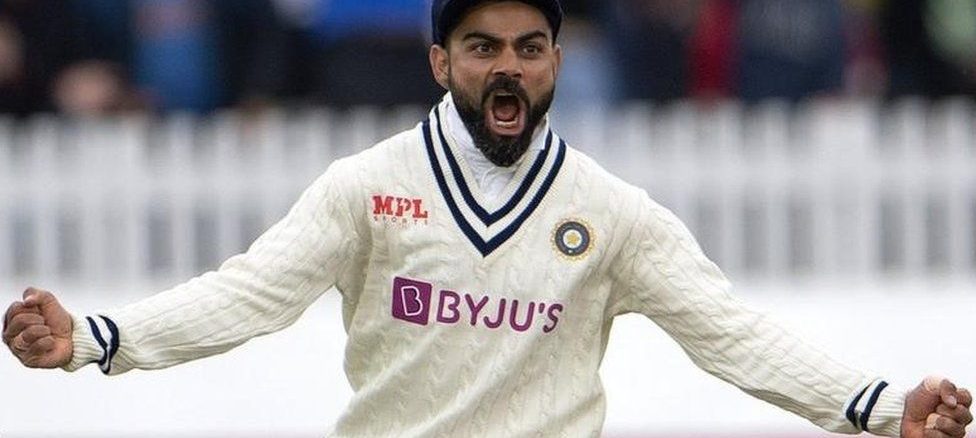
Was Kohli forced out By the Indian cricket board or did he see the writing on the wall?
Virat Kohli has stepped down as captain of India men's Test team. He captained India in a record-breaking 68 Tests, winning 40 matches – the fourth best record of any Test captain in history.
Few captains have taken on the Board of Control for Cricket (BCCI) in India the way Kohli did – he virtually called its president a liar as he contradicted what Sourav Ganguly had said about Kohli being asked to stay on as the Twenty20 captain when he decided to quit that format.
Board officials have long memories, and Kohli had put undue pressure on himself to succeed in South Africa.
From past experience, one knew that any excuse to cut Kohli down to size would be used post-South Africa. India losing the series 1-2 to a lower ranked team meant the board could claim legitimacy for its action. Kohli had pushed himself into a corner.
Not so long ago, a draw was considered the equivalent of a win for Indian cricket since the alternative was usually a loss.
Times have changed. Now India is expected to win everything. As skipper, Kohli has had a major role to play in this psychological reversal.
With 40 wins in 68 Tests as captain (24 at home, 16 away), he is India's most successful. History will judge him more kindly than his contemporaries will.
Unsurprisingly for someone who lived most of his life in the public eye – and provoked strong emotions – Kohli's actions were often overinterpreted. The temptation to look beyond the obvious meant that simpler motives were often ignored.
When Kohli was an over-aggressive, self-centred teenager, the popular feeling was that unless he mellowed, he had no chance of playing for India. People failed to understand that he was merely acting his age.
A cricket fan gets an arm painted with the image of India"s cricket captain Virat Kohli before the start of the first match between India and Pakistan in Twenty20 World Cup Super 12 stage in Dubai, in Ahmedabad, India, October 24, 2021.
Kohli became the poster boy of the psychologically self-confident India
Kohli's response was Shavian – instead of adopting himself to the ethos of the national team, he changed the culture of the national team to fit his philosophy.
Within a generation, the Indian team became aggressive, self-confident, wedded to the concept of victory and an uncompromising bunch of players who gave as good as they got. For fans, success in cricket was compensation for failure in other fields.
While announcing his resignation, Kohli said that in his cricket, he "left nothing out there". He didn't hold back personally either, and what you saw was what he was – committed, self-confident, and inspiring.
His belligerence was welcomed by the so-called "New India". If Sachin Tendulkar was the poster boy of the economically self-confident India, Kohli became the poster boy of the psychologically self-confident one.
The age of Kohli the captain is over, but Kohli the batsman will remain, and perhaps the end of the captain will see the resurgence of the batter. He hasn't made an international century in two years, and that must be worrying Kohli, who is his own severest critic.
Of the two questions that are in the air following Kohli's resignation, one needs to be answered soon while the other will be answered only in time.
India"s captain Virat Kohli (L) celebrates with teammates as they
Kohli changed the culture of the national team to fit his philosophy
The second one first – Kohli's legacy. Will India play with the same spirit and power as they did under him?
At Cape Town, in his final Test as captain, Kohli made a show of walking up to the stump microphone and expressing his disappointment at a decision taken off the field by the review system.
This was childish, petulant and unbecoming, and he ought to have been pulled up for it. The act also encouraged two other players to insult the broadcasters by accusing them of playing for the home team.
This is the part of the legacy India can do without.
Yet, there is much to be said for the positives: the self-belief and aggression, the spirit of one-for-all, all-for-one in the team. The legacy of fast bowling that seems natural now, but is a result of Kohli's role in developing a pack of world-class bowlers – from Jasprit Bumrah to those waiting in the wings.
The Kohli-driven emphasis on fitness should remain a feature of Indian teams from here on. And his support for Test cricket above all other formats too.
And now, the first question: who will succeed Kohli? Rohit Sharma is older and not a long-term solution. Yet, for the immediate future, he is clearly the man (India can't ignore his claims simply because he is prone to injuries).
The crucial slot here is that of the vice captain. Rishabh Pant – younger, and a certainty in all formats – is the obvious choice. A period of apprenticeship under Sharma will do him and Indian cricket much good.
It's useful to know that Kohli's boys will have Kohli in their corner.

Be the first to comment